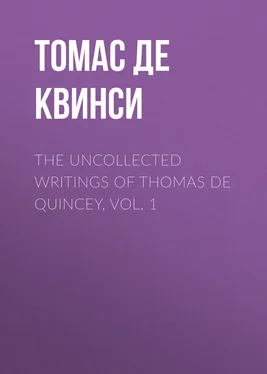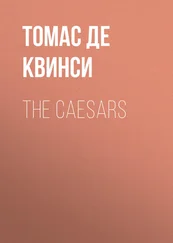Томас Де Квинси - The Uncollected Writings of Thomas de Quincey, Vol. 1
Здесь есть возможность читать онлайн «Томас Де Квинси - The Uncollected Writings of Thomas de Quincey, Vol. 1» — ознакомительный отрывок электронной книги совершенно бесплатно, а после прочтения отрывка купить полную версию. В некоторых случаях можно слушать аудио, скачать через торрент в формате fb2 и присутствует краткое содержание. Жанр: foreign_prose, literature_19, foreign_antique, на английском языке. Описание произведения, (предисловие) а так же отзывы посетителей доступны на портале библиотеки ЛибКат.
- Название:The Uncollected Writings of Thomas de Quincey, Vol. 1
- Автор:
- Жанр:
- Год:неизвестен
- ISBN:нет данных
- Рейтинг книги:4 / 5. Голосов: 1
-
Избранное:Добавить в избранное
- Отзывы:
-
Ваша оценка:
- 80
- 1
- 2
- 3
- 4
- 5
The Uncollected Writings of Thomas de Quincey, Vol. 1: краткое содержание, описание и аннотация
Предлагаем к чтению аннотацию, описание, краткое содержание или предисловие (зависит от того, что написал сам автор книги «The Uncollected Writings of Thomas de Quincey, Vol. 1»). Если вы не нашли необходимую информацию о книге — напишите в комментариях, мы постараемся отыскать её.
The Uncollected Writings of Thomas de Quincey, Vol. 1 — читать онлайн ознакомительный отрывок
Ниже представлен текст книги, разбитый по страницам. Система сохранения места последней прочитанной страницы, позволяет с удобством читать онлайн бесплатно книгу «The Uncollected Writings of Thomas de Quincey, Vol. 1», без необходимости каждый раз заново искать на чём Вы остановились. Поставьте закладку, и сможете в любой момент перейти на страницу, на которой закончили чтение.
Интервал:
Закладка:
Now, the chief thing to say as to Pindar is—to show cause, good and reasonable, why no man of sense should trouble his head about him. There was in the seventeenth century a notion prevalent about Pindar, the very contradiction to the truth. It was imagined that he 'had a demon'; that he was under a burthen of prophetic inspiration; that he was possessed, like a Hebrew prophet or a Delphic priestess, with divine fury. Why was this thought?—simply because no mortal read him. Laughable it is to mention, that Pope, when a very young man, and writing his Temple of Fame (partly on the model of Chaucer's), when he came to the great columns and their bas-reliefs in that temple, each of which is sacred to one honoured name, having but room in all for six, chose Pindar for one 13 13 The other five were Homer, Virgil, Horace, Aristotle, Cicero.
of the six. And the first bas-relief on Pindar's column is so pretty, that we shall quote it; especially as it suggested Gray's car for Dryden's 'less presumptuous flight!'
'Four swans sustain a car of silver bright,
With heads advanc'd, and pinions stretch'd for flight:
Here, like some furious prophet , Pindar rode,
And seem'd to labour with th' inspiring god .'
Then follow eight lines describing other bas-reliefs, containing 'the figured games of Greece' (Olympic, Nemean, &c.). But what we spoke of as laughable in the whole affair is, that Master Pope neither had then read one line of Pindar, nor ever read one line of Pindar: and reason good; for at that time he could not read the simple Homeric Greek; while the Greek of Pindar exceeds all other Greek in difficulty, excepting, perhaps, a few amongst the tragic choruses, which are difficult for the very same reason—lyric abruptness, lyric involution, and lyric obscurity of transition. Not having read Homer, no wonder that Pope should place, amongst the bas-reliefs illustrating the Iliad , an incident which does not exist in the Iliad . 14 14 Viz. the supposed dragging of Hector three times round Troy by Achilles—a mere post-Homeric fable. But it is ludicrous to add, that, in after years—nay, when nearly at the end of his translation of the Iliad , in 1718—Pope took part in a discussion upon Homer's reasons for ascribing such conduct to his hero, seriously arguing the pro and con upon a pure fiction.
Not having read Pindar, no wonder that Pope should ascribe to Pindar qualities which are not only imaginary, but in absolute contradiction to his true ones. A more sober old gentleman does not exist: his demoniac possession is a mere fable. But there are two sufficient arguments for not reading him, so long as innumerable books of greater interest remain unread. First, he writes upon subjects that, to us, are mean and extinct—race-horses that have been defunct for twenty-five centuries, chariots that were crazy in his own day, and contests with which it is impossible for us to sympathise. Then his digressions about old genealogies are no whit better than his main theme, nor more amusing than a Welshman's pedigree. The best translator of any age, Mr. Carey, who translated Dante, has done what human skill could effect to make the old Theban readable; but, after all, the man is yet to come who has read Pindar, will read Pindar, or can read Pindar, except, indeed, a translator in the way of duty. And the son of Philip himself, though he bade 'spare the house of Pindarus,' we vehemently suspect, never read the works of Pindarus; that labour he left to some future Hercules. So much for his subjects: but a second objection is—his metre: The hexameter, or heroic metre of the ancient Greeks, is delightful to our modern ears; so is the Iambic metre fortunately of the stage: but the Lyric metres generally, and those of Pindar without one exception, are as utterly without meaning to us, as merely chaotic labyrinths of sound, as Chinese music or Dutch concertos. Need we say more?
Next comes the drama. But this is too weighty a theme to be discussed slightly; and the more so because here only we willingly concede a strong motive for learning Greek; here, only, we hold the want of a ready introduction to be a serious misfortune. Our general argument, therefore, which had for its drift to depreciate Greek, dispenses, in this case, with our saying anything; since every word we could say would be hostile to our own purpose. However, we shall, even upon this field of the Greek literature, deliver one oracular sentence, tending neither to praise nor dispraise it, but simply to state its relations to the modern, or, at least, the English drama. In the ancient drama, to represent it justly, the unlearned reader must imagine grand situations, impressive groups; in the modern tumultuous movement, a grand stream of action. In the Greek drama, he must conceive the presiding power to be Death ; in the English, Life . What Death?—What Life? That sort of death or of life locked up and frozen into everlasting slumber, which we see in sculpture; that sort of life, of tumult, of agitation, of tendency to something beyond, which we see in painting. The picturesque, in short, domineers over English tragedy; the sculpturesque, or the statuesque, over the Grecian.
The moralists, such as Theogins, the miscellaneous or didactic poets, such as Hesiod, are all alike below any notice in a sketch like this. The Epigrammatists, or writers of monumental inscriptions, &c., remain; and they, next after the dramatic poets, present the most interesting field by far in the Greek literature; but these are too various to be treated otherwise than viritim and in detail.
There remains the prose literature; and, with the exception of those critical writers who have written on rhetoric (such as Hermogenes, Dionysius of Halicarnassus, Demetrius Phalerius, &c. &c., some of whom are the best writers extant, on the mere art of constructing sentences, but could not interest the general reader), the prose writers may be thus distributed: 1st, the orators; 2nd, the historians; 3rd, the philosophers; 4th, the literateurs (such as Plutarch, Lucian, &c.).
As to the philosophers, of course there are only two who can present any general interest—Plato and Aristotle; for Xenophon is no more a philosophic writer than our own Addison. Now, in this department, it is evident that the matter altogether transcends the manner. No man will wish to study a profound philosopher, but for some previous interest in his doctrines; and, if by any means a man has obtained this, he may pursue this study sufficiently through translations. It is true that neither Sydenham nor Taylor has done justice to Plato, for example, as respects the colloquial graces of his style; but, when the object is purely to pursue a certain course of principles and inferences, the student cannot complain much that he has lost the dramatic beauties of the dialogue, or the luxuriance of the style. These he was not then seeking, by the supposition—what he did seek, is still left; whereas in poetry, if the golden apparel is lost, if the music has melted away from the thoughts, all, in fact, is lost. Old Hobbes, or Ogilbie, is no more Homer than the score of Mozart's Don Giovanni is Mozart's Don Giovanni .
If, however, Grecian philosophy presents no absolute temptations to the attainment of Greek, far less does Grecian history. If you except later historians—such as Diodorus, Plutarch, and those (like Appian, Dionysius, Dion Cassius) who wrote of Roman things and Roman persons in Greek, and Polybius, who comes under the same class, at a much earlier period—and none of whom have any interest of style, excepting only Plutarch: these dismissed, there are but three who can rank as classical Greek historians; three who can lose by translation . Of these the eldest, Herodotus, is perhaps of real value. Some call him the father of history; some call him the father of lies. Time and Major Rennel have done him ample justice. Yet here, again, see how little need of Greek for the amplest use of a Greek author. Twenty-two centuries and more have passed since the fine old man read his history at the Grecian games of Olympia. One man only has done him right, and put his enemies under his footstool; and yet this man had no Greek . Major Rennel read Herodotus only in the translation of Beloe. He has told us so himself. Here, then, is a little fact, my Grecian boys, that you won't easily get over. The father of history, the eldest of prose writers, has been first explained, illustrated, justified, liberated from scandal and disgrace, first had his geography set to rights, first translated from the region of fabulous romance, and installed in his cathedral chair, as Dean (or eldest) of historians, by a military man, who had no more Greek than Shakspeare, or than we (perhaps you, reader) of the Kalmuck.
Читать дальшеИнтервал:
Закладка:
Похожие книги на «The Uncollected Writings of Thomas de Quincey, Vol. 1»
Представляем Вашему вниманию похожие книги на «The Uncollected Writings of Thomas de Quincey, Vol. 1» списком для выбора. Мы отобрали схожую по названию и смыслу литературу в надежде предоставить читателям больше вариантов отыскать новые, интересные, ещё непрочитанные произведения.
Обсуждение, отзывы о книге «The Uncollected Writings of Thomas de Quincey, Vol. 1» и просто собственные мнения читателей. Оставьте ваши комментарии, напишите, что Вы думаете о произведении, его смысле или главных героях. Укажите что конкретно понравилось, а что нет, и почему Вы так считаете.












